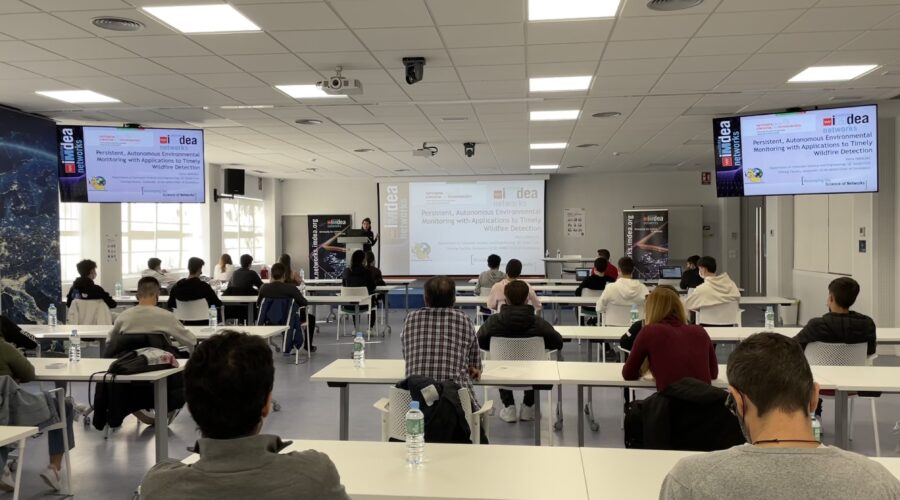IMDEA Networks

Innovation to prevent wildfires: IMDEA Networks at Science and Innovation Week
The students of the 4th year of ESO of the bilingual high school IES La Serna of Fuenlabrada have attended the activity organized at the headquarters of the institution
11 November 2021

IMDEA Networks has once again participated in the Madrid Science and Innovation Week, an event of scientific dissemination and citizen participation organized by the Community of Madrid through the Fundación para el Conocimiento madri+d whose objective is to actively involve citizens in science, technology and innovation. We have hosted 4ºESO students from the bilingual high school IES La Serna in Fuenlabrada at our headquarters in Leganés. This event has been an excellent opportunity to promote scientific vocations and thus continue our work of knowledge transfer to society.
On this occasion, the talk was given by Dr. Katia Obraczka (Professor of Computer Science and Engineering at UC Santa Cruz), who is currently Visiting Professor at IMDEA Networks through a Chair of Excellence at the University Carlos III of Madrid and Banco Santander, under the title “An Internet of Things System for Timely Wildfire Monitoring”. The educational talk (introduced by Domenico Giustiniano, Research Professor at IMDEA Networks) dealt with a hot topic, such as the multiple large-scale forest fires that have occurred in recent years in different parts of the world causing catastrophic damage. California, the state where Katia works, is a good example of this. There have also been cases in Spain where, for instance, this summer, Avila suffered one of the worst fires in the history of Castilla y León. Moreover, the forecast is that they are expected to increase in frequency and intensity in the coming years due to climate change and changes in urbanization patterns.
Prof. Katia Obraczka has described PANTHER (Persistent Autonomous Monitoring for Timely Detection of Wildfires), an energy-efficient IoT (Internet of Things) system designed to be deployed in remote areas to monitor environmental conditions conducive to wildfire initiation and growth, as well as support wildfire mitigation and preparedness efforts.
PANTHER consists of clusters of mini weather stations that collect temperature, wind, soil moisture, and visual information about the surrounding environment and relay information through a wireless network to data collection sites. Although it is focused on wildfire detection, it can be adapted to various outdoor monitoring applications.
As highlighted by the researcher, her team’s goal is to demonstrate that the system’s ability to continuously collect fine-grained environmental data that complements data from existing remote sensing systems and weather stations “will improve not only response time, but the ability to predict weather events in the future.” An even more important task when part of the world’s population has increased its mobility to non-urban environments.
But before getting into the subject, Katia made a dynamic introduction to contextualize what is the Internet of Things and the concept of networks, which made it easier for students to follow the talk and encouraged them to participate and ask questions. As Eduardo Morales, biology teacher of IES La Serna, pointed out: “It has been a very interesting and innovative talk, as the speaker has managed to capture the attention from the first moment, in a very informative way. It has been an activity that, in addition, will be useful to be discussed in class”. This initiative, held at IMDEA Networks within the framework of Science and Innovation Week, has once again demonstrated the potential of dissemination to society, especially to young people.



Recent Comments